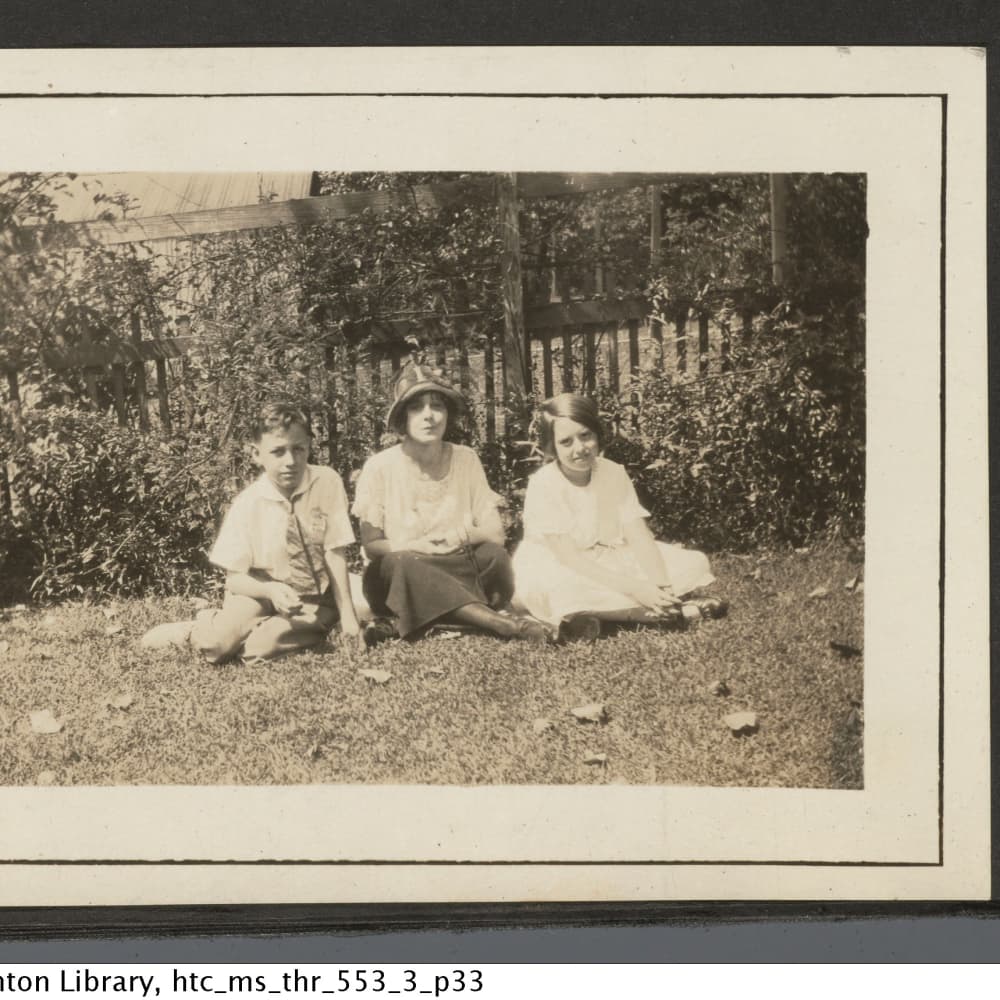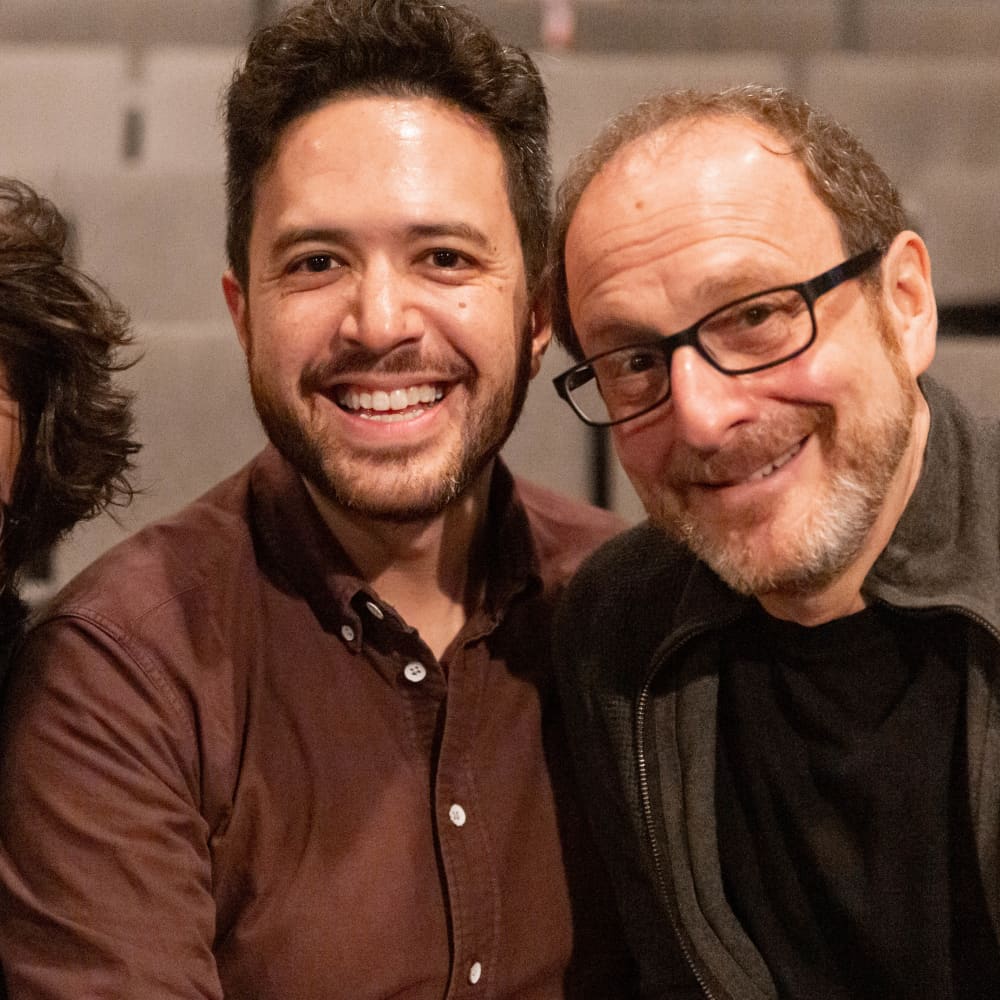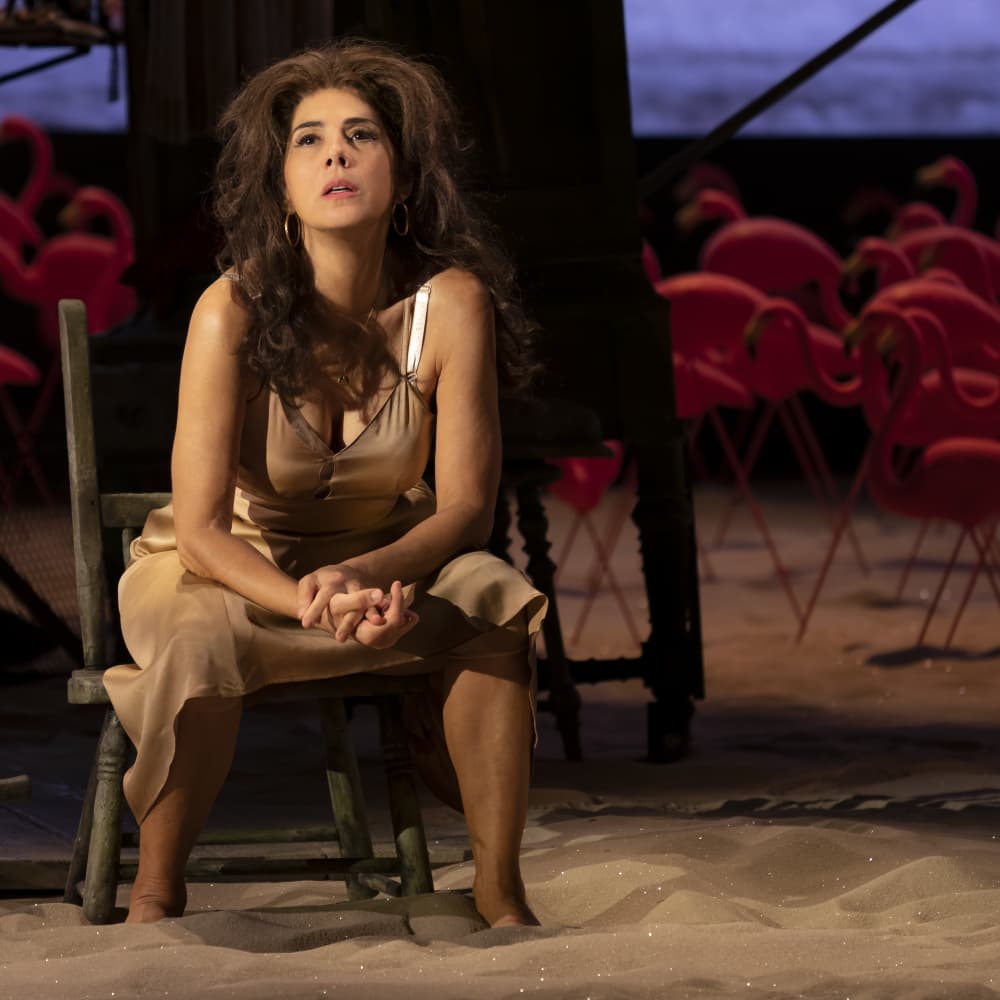The Rose Tattoo:
A conversation with Annette Saddik, Tennessee Williams scholar, and playwright Joey Merlo.
Posted on: October 21, 2019
On October 5, 2019, Annette Saddik and Joey Merlo spoke about The Rose Tattoo with education dramaturg Ted Sod as part of Roundabout Theatre Company’s lecture series. (There are spoilers below) An edited transcript follows:
Ted Sod: Annette, how does this play differ from some of the earlier plays of Williams? How do you understand it stylistically? Audiences I’ve spoken to are amazed at how much comedy is in this play.
Annette Saddik: Williams never saw comedy and tragedy as separate. He started pushing humor a bit more in his plays in the 1950s. The Rose Tattoo is very much a Dionysian celebration. It’s a grotesque carnival that celebrates excess in its many manifestations and ends in a renewal or a rebirth. And this is something that Williams would continue to celebrate in the plays he wrote in the 60s, 70s and 80s. What Williams is doing here is creating a coexistence of contradictions, exploring the tension between social appearances, or the “artificial,” and savage, or “animal,” desire. And what emerges is something new, not one or the other, but a coexistence. For Williams, that was where we find truth. Similarly, the carnival sensibility he creates in this play is at times very campy. It turns everything upside down. It’s a new way of looking at things. A different way of looking at things.
TS: Joey, I’m so curious, and I hope this doesn’t disarm you, but, how old were you when you found out you were related to Tennessee Williams’s lover, Frank Merlo?
Joey Merlo: I was 21-years-old. It was my senior year of college and I had not yet come out to my family. I was born in Elizabeth, New Jersey, like Frank was. Our whole family is from Elizabeth. Long before I knew about Frank and Tennessee I was interested in theatre. I went to a performing arts high school in New Jersey and I studied acting and writing at NYU. I went through my own heartbreak and ended up going to Ghana where I made a film about homosexuality. While I was filming, I got a call from my dad and he was saying, “Joe, Joe. I’m at grandma’s house and I gotta read you this eulogy. It’s the eulogy of great uncle Frank. I gotta read you this. This is amazing.” And he starts reading this beautifully written eulogy that had been published in the local Peterstown paper. Then he said, “You know, Joe, this is written by someone very, very famous. His name is Mississippi something -- you know, the guy who wrote, “Stella!!!” And I said, “Tennessee Williams?” And he was like “Yeah, yeah! Joe, do you get it? They were lovers. They were lovers!” I was shocked that he would be excited because he is a very machismo Italian-American guy and it never felt like it was something he would be excited about. That’s when I started my own research. I connected with other family members and got to meet people like Annette and other Williams scholars. Over the past 10 years I’ve continued researching Frank and Tennessee, who I feel have become my ghost mentors. They’ve inspired me greatly as a person and as an artist, and their story gave me the courage to come out to my family.
TS: So, when you see or read the play -- and this is for both of you to answer -- do you see Williams and Merlo in it? Are they Mangiacavallo and Serafina? Or is that too reductive?
JM: I see them in it. We were saying backstage that the spirit of their relationship and of their romance is in the play. For me, the various drafts of this play show Tennessee healing in real-time. He was in a place where he thought he wasn’t able to be loved or truly love another person. He was coming out of an extremely difficult relationship with Pancho, his lover before Frank, he was depressed, he had writer’s block, and to me, he documented, through this play, the re-opening of his own heart. That beautiful scene when Serafina falls over and says, “it hurts, it hurts” and Mangiacavallo comes to her and helps her catch her breath -- that very much encapsulates Frank and Tennessee’s relationship. Frank was very steady. He was a grounding force for Tennessee. Williams wrote about how Frank would just hold his hand and look into his eyes and they would breathe together.
TS: Annette, do you agree?
AS: Yes, absolutely. He was not only coming out of the relationship with Pancho, but also his first great love, Kip Kiernan, whom he met in Provincetown in 1940 – he fell in love with Kip who for all intents and purposes could be characterized as bisexual -- Kiernan fell in love with Williams and then left him and dated a woman. Williams was devastated by this. A few years later, Kip died of a brain tumor very young, in his 20s. There was always this sense – and if you know his plays this is key – of great desire in his writing. This idea of desire as a kind of ecstasy. It’s not just physical. I think he finally felt that with Frank. They initially met in Provincetown in 1947, they had relations and then didn’t see each other and then ran into each other again in New York City a year later. Williams said, “Why didn’t you call me? Why didn’t we see each other again?” Frank said, “I heard about your success with Streetcar and I didn’t want to jump on the bandwagon and have you think I was just chasing a celebrity.” They stayed together, more or less, till Frank’s death due to lung cancer in 1963.
TS: Joey, I understand Williams saw your cousin in a deli on Lexington Avenue?
JM: Tennessee was buying egg salad because he was hungry late one night and Frank was there, in the deli, with a navy buddy. Frank lied about his age to join the navy and fight in World War II. He had a crazy life leading up to his connection with Tennessee whom he met when he was still a very young man. I read something in Tennessee’s journal, right before he met Frank in ’47, where he was talking about not being able to trust young men who had come into his life and how they tried to manipulate him. He talked about a man who had told him that he had survived a brain aneurism, and Tennessee was paranoid because he thought this person knew about Kip and about that loss. And, in that same way in the play, you see Serafina thinking she is being fooled by Mangiacavallo. I sense Williams felt that Frank was the real deal and was a sincere, honest person that he could connect with.
AS: Williams didn’t want to be tricked, he didn’t want to be fooled. He was very defensive in that way and didn’t give his heart very easily. But with Frank, they had something very real.
TS: Joey, will you please tell the story about your cousin and Williams when they were in the company of a Hollywood mogul?
JM: They were in Hollywood for negotiations about making Streetcar into a movie, and they were sitting with Louis B. Mayer. Mayer was agitated about Frank, and finally, he turns to Frank and he says, “So what is it that you do?” and Frank said, “I sleep with Mr. Williams.” They had a lot of chutzpah for their time. However, they also had a very complex, deep and beautiful relationship. Tennessee said Frank was the kindest man he had ever known and their time together proved to be the healthiest and most productive years of his career. To the outside world, Frank was forced to be known as Williams personal secretary but in reality, he was his husband, confidant and collaborator.
TS: Annette, as I understand it Summer and Smoke was a failure in ’48; the critics were dismissive. Four years later it gets done at Circle in the Square downtown with Geraldine Page and the critics decide they love it. After two huge successes with The Glass Menagerie and A Streetcar Named Desire, he’s at sea.
AS: That’s all true.
TS: Williams is at sea and Frank takes him to Sicily to visit relatives. Do you know about this trip to Sicily, Joey?
JM: They did go to Sicily and Tennessee was very inspired there. There’s one story about a cousin in Ribera (that’s where our family is from), and in the play, Ribera is where Mangiacavallo is from. Anyway -- there’s a story about a cousin of ours in Ribera whose parents were very upset because she got pregnant before she married, and Tennessee paid for her dowry. There’s a lot of family lore about Tennessee and Frank and The Rose Tattoo. There are stories about Marlon Brando coming over and eating at Frank’s mother Rosalie’s house, and stories about Tennessee bringing his silk shirts to her because only Frank’s mother knew how to wash them the right way. There are stories about Tennessee sitting there, being enamored with this culture of which he was on the periphery, scribbling down dialogue.
TS: Mangiacavallo means “eat a horse” as we are told in the play, but can you tell people what Tennessee’s nickname was for your cousin?
JM: It was “Little Horse.” And in an earlier version of this play, that character’s last name was Blackbird –- which is what Merlo means in Italian. They had a lot of little inside jokes like that sprinkled into the script.
AS: If I could return to what we were addressing earlier about how disarming the humor is in the play for some people – in a lot of his plays in the 40s, the big hits, the humor and a lot of the irony he intended was taken out because Williams wanted the plays to be successful. He allowed changes that made the plays more sentimental and naturalistic. With The Glass Menagerie, for example, I’ve talked about this before, there are screen devices or titles above each scene and for Williams, this made each scene ironic and he thought this was hysterical. He thought we weren’t supposed to take Laura and the situation she is in too seriously. For example, when Laura realizes that the boy that’s coming to dinner is Jim, the one she loved in high school, the title that’s supposed to appear above the action is, “Oh no, not Jim!” In Streetcar, at the end, with Blanche’s line, “I have always depended on the kindness of strangers,” Williams thought that was a hysterical line and there’s a famous story about how he used to sit in the back of the auditorium and when that line was uttered, he would start laughing and people would turn around to see who this rude man was, laughing inappropriately at this serious moment. For him it was an insider, campy, playful poke at the gay community that could be seen as a coded “cruising” reference. That coexistence of humor and tragedy was always there. It was just pared down for the major works. He went from The Rose Tattoo in 1951 to Camino Real in 1953 -- Camino incorporated a great deal of the grotesque and carnivalesque and it was a failure. And a part of the reason it failed was because Kazan directed it as realism. He didn’t know what to do with it and Williams responded with a complete 180 and gave us Cat on a Hot Tin Roof -- which is his most realistic play. It even follows Aristotle’s three unities of time, place and action. He literally went back and forth in terms of the comic richness he was capable of writing.
TS: How do you two respond to the play? For me, it really is about allowing yourself to love again. I think what Serafina goes through is an immense catharsis. I have to say that what Estelle does to her is cruel when she brings that fabric for her to sew. It’s so territorial and mean spirited. It takes three years for Serafina to begin to defrost her heart and be part of reality again. I find it so moving to watch somebody wrestle with betrayal in such a profound way and then allow themselves to fall in love. How do you see it?
AS: When I saw “Three Years Later” projected on the rear screen, I remembered from personal experience that three years is perhaps when you start to feel human again after a period of intense grief. It struck me as very real. You see the same thing in Orpheus Descending. It’s almost the same parallel, with the Italians on the Gulf Coast, and finding love again – it’s a different reason – but what we realize is that the heroine, Lady Torrance, falls in love with this young man who comes into town. In Orpheus, her husband is not only dying, but he’s this negative force. Lady Torrance finds out later that it was her husband who set the fire that her father died in because he was part of the Ku Klux Klan. In both plays, you see the same rebirth, and it’s borne from the same kind of relationship. Even at the end there’s life in her body. It’s the same paradigm. There’s a celebration of desire, a celebration of life, of learning to love again after tragedy.
TS: Joey, how did the play strike you? I know you know it well.
JM: I thought it was gorgeous. I think the cast is so talented and Marisa is a force of nature. I was blown away by her meticulously crafted and brilliant performance. To finally see the play fully come alive was a privilege for me. I had never seen it live.
TS: I’ve never seen it live either, so I was thrilled when they announced it for this season. Annette, I can’t imagine you haven’t seen it before.
AS: I’ve seen it a few times.
TS: Do they play it a little bit more naturalistically here than in other productions you’ve seen?
AS: No. The last one I saw was a year ago, almost exactly a year ago, was at the Provincetown Tennessee Williams Festival and that was also an excellent production, a little bit different. Obviously, they had a smaller budget, but it also celebrated that kind of excess we’ve been noting and was not realistic. But this production is such a beautiful celebration of love in its many guises. And the stage pictures were fantastic.
Audience Question #1: I was fascinated by the scenery. Can you talk a little bit about it?
TS: The designer is the brilliant Mark Wendland. He’s one of my favorite designers. Mark has done some spectacular work. He does work often with Trip. Trip last directed Significant Other for us – it was written by Joshua Harmon and staged off-Broadway and later on Broadway -- it had multiple locations and I thought Mark came up with the most cunning solution to how to do that. It was almost like Hollywood Squares because he had all these boxes that became various rooms and places. And Lucy Mackinnon has done the projections, I think they’re stunning. That point in the play where it is nigh and the ocean behind them becomes dark blue is so evocative. And usually video pulls my focus from the acting, but I thought this was well done. I also love the hanamichi, which is a Japanese stage device, the sand that they use, the real candles, the plastic flamingos. And I have to say, as somebody who has performed but doesn’t do it with any conviction anymore because I can’t, the actors don’t have a lot of things to hang on to. They’re standing on their own in many instances like in Shakespeare. They have to plant their feet and play. And that’s not exactly easy. You have to physicalize everything because you’re not hanging on to the back of a sofa. I also think the set cleverly uses the entire width of the stage. This is the widest theatre on Broadway, and I think Mark has used it very cleverly. Did you guys want to say anything about the set?
AS: I love the fact that this area to my left is a cluttered corner and we see all those candles and the shrine to the Madonna, and everything else is wide open.
JM: Trip’s direction is so fluid and wonderful. I love the way the bodies move through space.
Audience Question #2: Tennessee apparently had a very dysfunctional childhood. We look at the women in his life – his mother – we don’t know the exact nature of her psychopathology -- but the relationship she had with her daughter was very dysfunctional. The daughter became paranoid and her mother opted to get her a frontal lobotomy. My question is, from what you know, what was the impact that those relationships had on Wiliams’s relationships with women?
AS: It’s a long, long answer. But I am giving you a short one: Yes, of course, it affected him. If you know the play Suddenly, Last Summer or the film, he had incredible guilt about allowing his parents, specifically his mother, to give his sister Rose a prefrontal lobotomy. And a similar thing happens in that play. He was very close to his sister and that relationship became more complicated in his 20s. He also had a lot of guilt for once being mean to Rose. Rose had tattled on him to his parents and he said something to her like “I hate the sight of your ugly old face,” and he never forgave himself for that. So, there’s a lot of complicated feelings that he had about his mother, his sister and his father and their relationships to each other. How that affected his relationship with women, that’s a complicated question. There are many books and scholarly theses written about that very subject. But they are all open to interpretation.
JM: Repression is always a part of Tennessee’s work. His sister was sexually repressed, he was sexually repressed, and I think that both characters, Alvaro and Serafina, are sexually repressed when they first meet.
TS: A couple of things I understand, the Suddenly, Last Summer line, “Cut that horrible story out of her head” comes from Rose’s insistence that her father was sexually molesting her. Is that true or not?
AS: People have suggested that. There’s some theories about that but it doesn’t have a lot of credence in the Williams scholar circles.
TS: The other things I want to tell you is that most likely because of the guilt that Williams had about his sister, she inherited everything, practically. Dakin, the brother, got $25,000 dollars, which he contested. But Rose got everything. About $10 million as I understand it. And then of course, it was passed on to the University of the South, Sewanee, which is now who you have to deal with, along with an agent, when you want to make changes to his texts. The only other thing I want to say about Williams and women is that it’s well known that of the three major male American playwrights -- Williams, O’Neill and Miller -- Williams writes the most amazing roles for women. He had a deep understanding of that psyche. Would you agree?
AS:Absolutely. One of the things that he was the first to do was to give his female characters desire. He was criticized in the 1950s and 60s for writing women who were not real and one of the critics called his women, especially Blanche DuBois, “men in drag.” And what was meant by that was that these were just a gay man’s idea of what women should be. “Women don’t feel like this. Women don’t have these kinds of desires. Women aren’t this bold and excessive and passionate.” But other male playwrights were not writing women accurately and it took a man like Tennessee in the 1940s and 1950s to write women who were real and complicated.
TS: It’s not the first time that a gay playwright has been accused of writing women who were really men. For years, they’ve been saying that it’s really four men in Albee’s play Who’s Afraid of Virginia Woolf?
Audience Question #3: At the beginning of Act Two or thereabouts, Mangicavallo and Serafina cry. And she says “I have to cry” or something like that and they both cry. This is one time where I feel Williams portrays empathy, which is missing in most of his plays.
TS: Interesting. I wouldn’t agree with that appraisal of his plays -- but how do you respond to that, Annette?
AS: I don’t agree with that either. Where do you not see empathy in his plays?
TS: I think he’s very empathetic, especially with characters like Blanche and Laura. Even to a degree with the Princess Kosmonopolis. Everybody is entitled to their own opinion because art is subjective, but I find that an interesting observation and I’m certainly not going to deny your perspective. That’s why I love my job, I hear so many different perspectives.











